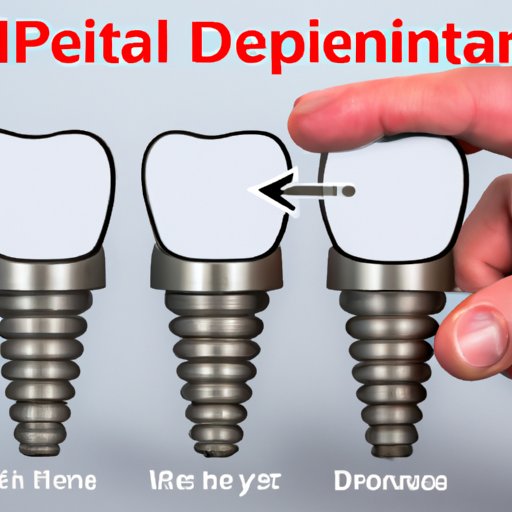
I. Introduction
Dealing with the cost of dental implants can be a daunting task for patients, especially when medical insurance doesn’t cover the procedure. However, many people are unaware that they may be able to get dental implant cost coverage through their insurance. This article explores how to navigate medical insurance providers to obtain coverage and make dental implants affordable for you.
II. Importance of Dental Implants
Dental implants are a type of dental surgery used to replace a missing tooth, and they are becoming increasingly popular among patients. Dental implants offer several benefits, including an improvement in the patients’ self-confidence, better oral health, restored ability to eat and speak, and improved facial features. Unlike other tooth replacement methods, dental implants are known to last a lifetime, so it’s worth considering them as a long-term investment in your dental health.
III. Insurance Providers That Cover Dental Implants
The following are insurance providers that offer coverage for dental implants:
- Medicare Advantage Plans
- Delta Dental
- Blue Cross Blue Shield
- Cigna
- United Healthcare
It’s worth noting that not all plans offered by these providers cover dental implants, and the coverage options vary between providers.
IV. The Eligibility Criteria
Before obtaining dental implant cost coverage, you must first meet your insurance provider’s eligibility criteria. Most providers require that you meet specific conditions to be eligible. Some of the common coverage criteria include:
- Lack of natural teeth due to an injury or disease
- Patients who are unable to wear removable dentures
- Patients who require bone grafts or other bone-related procedures
- Prior authorization from the insurance provider
V. Step-by-Step Guide
To obtain dental implant cost coverage for your medical insurance, follow these steps carefully:
- Confirm with your provider if they offer coverage for dental implants
- Confirm your eligibility status with your provider
- Provide all required documentation, such as X-rays and dental records
- Consult with a dental professional to ascertain the cost of the implant procedure and any associated costs
- Request a pre-authorization from your provider
- Complete the implant procedure with an approved dental professional and obtain the necessary documentation
- Submit a claim for reimbursement with your insurance provider.
It’s important to note that the documentation and requirements for each provider will differ; therefore, we suggest that you reach out to your insurance provider for in-depth guidance throughout the process.
VI. Advice from Experts
When navigating dental implant cost coverage with medical insurance, it’s always essential to seek expert opinions to avoid common pitfalls and make informed decisions. Here are some insights and strategies from dental and insurance professionals:
- Dr. John C. Cranham D.D.S recommends that patients thoroughly research dental professionals to ascertain their expertise before undergoing the procedure and often recommends that patients consult with different dental professionals for different stages of the procedure
- According to many insurance professionals, coverage options usually vary depending on the procedure, and patients should always read the fine print on their insurance policies carefully
- Dr. Marc Sclafani recommends asking your insurer directly for coverage options for dental implants.
VII. Cost and Affordability
Dental implants are often an expensive procedure for most patients, with the cost of the procedure ranging from $3,000 to $7,000 for a single tooth replacement. Patients can access the following options to make the procedure more affordable:
- Inquire if your dental professional offers payment plans; some dental professionals offer a financing arrangement to help you managing the cost of the procedure in bite-sized pieces
- Some dental professionals offer substantial discounts for upfront payment, so consider inquiring if this is an option with your dental professional
- Insurance coverage is available for dental implants; therefore, it’s worth considering this option if you qualify for coverage
- If you have a flexible spending account, this often offers a pre-tax payment plan option to help you manage the cost of the procedure more efficiently.
VIII. Conclusion
This comprehensive guide covers everything you need to know about how to get dental implants covered by medical insurance. It’s essential to research the requirements and options available carefully to make informed decisions suitable for your needs. Remember, dental implants offer a lifetime investment in your oral health and significant benefits for your overall wellbeing and self-confidence.




